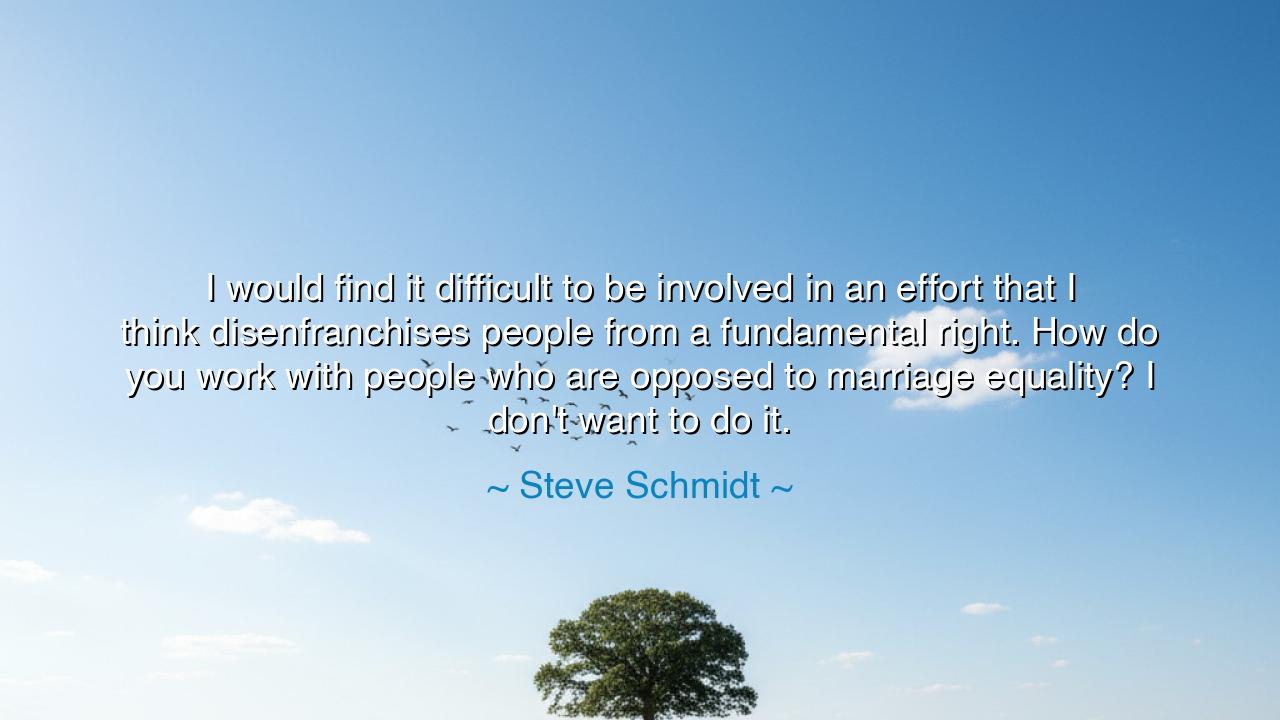
I would find it difficult to be involved in an effort that I
I would find it difficult to be involved in an effort that I think disenfranchises people from a fundamental right. How do you work with people who are opposed to marriage equality? I don't want to do it.






In the long and storied journey of human progress, there are moments when the call for justice rings out so clearly that it becomes impossible to ignore. The words of Steve Schmidt—"I would find it difficult to be involved in an effort that I think disenfranchises people from a fundamental right. How do you work with people who are opposed to marriage equality? I don't want to do it"—speak to the moral clarity that defines the great struggles for freedom throughout history. His words are a declaration of the importance of standing firm in the face of efforts that seek to deny others their inherent rights. To disenfranchise others is not simply an act of political oppression; it is a moral failure—a betrayal of the principles of equality that bind us all as human beings.
The essence of marriage equality lies in the fundamental truth that all people, regardless of gender or sexual orientation, deserve the same rights and recognition under the law. Marriage—the sacred union between two people—is not a privilege to be awarded based on arbitrary distinctions, but a right that belongs to all, as a reflection of the most basic human dignity. Schmidt’s reluctance to engage in efforts that would disenfranchise others from this fundamental right is a testament to the moral clarity that drives many who stand in the fight for equality. He speaks not just as a political strategist, but as a human being who recognizes that any attempt to divide people into those who deserve rights and those who do not is an affront to the very nature of justice.
Consider the battle for civil rights in the United States, led by the great Dr. Martin Luther King Jr., whose words and actions were fueled by the same moral clarity that Schmidt speaks of. King understood that justice is not just a matter of laws or policies; it is a matter of the heart. The right to vote, the right to marry, and the right to live without fear of discrimination are not privileges that can be dispensed by some and withheld by others. King’s commitment to equality and freedom was unwavering, even in the face of those who sought to deny these basic rights. His refusal to work alongside those who would disenfranchise others became the very foundation of his movement. He recognized that moral clarity is not a luxury but a necessity in the fight for justice.
In our own time, the fight for marriage equality reflects a similar struggle. The resistance to allowing same-sex couples the right to marry has been one of the most contentious battles in recent history. Yet, just as the civil rights movement challenged the racial discrimination of its day, so too does the marriage equality movement challenge the discriminatory practices that still persist in many parts of the world. Schmidt’s words resonate deeply here: How can one stand by and support efforts that seek to disenfranchise a group of people from their fundamental rights? The answer is clear: one cannot. To do so would be to abandon the moral duty to fight for the dignity and equality of every human being.
The lesson from Schmidt’s words is one that should guide each of us in our own lives: moral clarity is a powerful tool in the fight for justice. There are times in history when we are called upon to make choices that define who we are and what we stand for. Equality, at its heart, is not just a political issue—it is a moral one. To stand for equality is to stand for the very idea that every person, regardless of their background, beliefs, or identity, deserves the same freedom, rights, and respect as any other. It is a challenge that each generation must face—whether the struggle is for racial equality, gender equality, or marriage equality—and it is a challenge that calls for unwavering commitment.
In your own life, take Schmidt’s example to heart. When you encounter efforts to disenfranchise others, whether in the form of laws, policies, or societal attitudes, ask yourself: Can you remain silent? Can you support an effort that seeks to deny others their basic rights? The answer is likely no. Stand for equality—in your thoughts, your words, and your actions. Refuse to support efforts that seek to divide or diminish the inherent dignity of others. In doing so, you align yourself with the great movements of history, from Dr. King to Schmidt, who have always known that justice is not just about law, but about the shared humanity that binds us all.
May you walk the path of moral clarity with courage, recognizing that every act of support for equality strengthens the foundation of a better, more just world. Remember that the fight for equality is not a battle of one group against another, but a fight for the very soul of humanity. Whether it is the right to marry, the right to live free from discrimination, or any other fundamental right, we must stand united in the belief that all people, without exception, deserve the same dignity and freedom. And when the time comes, may we each have the courage to speak out, to stand firm, and to fight for what is right.






AAdministratorAdministrator
Welcome, honored guests. Please leave a comment, we will respond soon